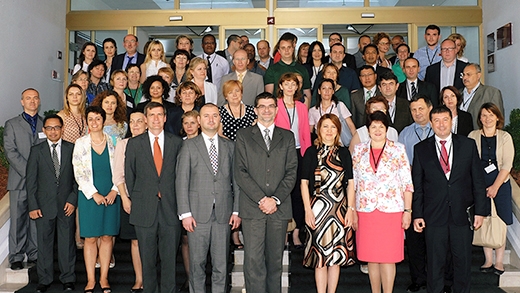Untold billions of taxpayer dollars are wasted each year through error, fraud and corruption (EFC) in social protection programs. In countries across Europe and Central Asia, the cost to government revenue is significant, but the real impact is ultimately felt by citizens who are denied the full benefit of pensions, unemployment benefits or social assistance programs.
Even a fraction of loss in the social protection budget caused by EFC can mean that people have less access to vital social services such as healthcare or education. This has tangible costs in the fight to eradicate extreme poverty and promote shared prosperity.
In this challenging post-economic crisis period – when the least fortunate people in the region need more assistance than ever – the loss of precious government revenue not only hampers the delivery of critical public services, but also causes deep-rooted mistrust of public administrations. Governments are consequently under increased scrutiny to minimize EFC and improve the way they manage and run social protection systems.
Responsible for delivering cash payments and benefits to citizens regularly, social protection systems are by their very nature large, complex and bureaucratic – making them susceptible to error and fraud. No country manages to completely avoid some level of misuse or abuse of public funds.
Even in OECD countries, which have some of the strictest control and accountability mechanisms in place, EFC accounts for about 2% to 5% of social protection spending annually. In the United Kingdom alone, fraud against the public sector costs the economy more than £25 billion (about US$42.5 billion) each year – even though it is one of the more successful countries in minimizing waste of public funds.
In middle-income countries with poor EFC controls, the leakage of public funds due to EFC likely represents a higher proportion of social protection spending.
High rates of EFC can be hugely detrimental to an economy’s growth and development considering that, on average, social protection spending represents 15.7% of GDP in developed countries, 7.4% in middle-income countries, and 3.8% in low-income countries. For example, a loss of just 5% of social spending due to EFC in a typical middle-income country adds up to 0.4% of GDP - the same amount that is generally spent on programs targeted for the poor.
In Europe and Central Asia, countries such as Albania, Croatia, Moldova and Romania have started to make significant progress by putting in place effective systems, tools and instruments to combat EFC in their social protection systems. The World Bank is supporting these and other countries in the region through results-based loans, provision of technical assistance and investment in capacity building.
As part of this effort and with financial support from the Ministry of Finance of the Russian Federation, the World Bank organized a workshop in Croatia on 8-12 June 2014 on Reducing Error, Fraud and Corruption in Social Protection Programs. High-level policy makers and social protection practitioners from countries around Europe and Central Asia gathered to discuss how to develop comprehensive and cost-effective systems to combat irregularities in their social protection programs.


